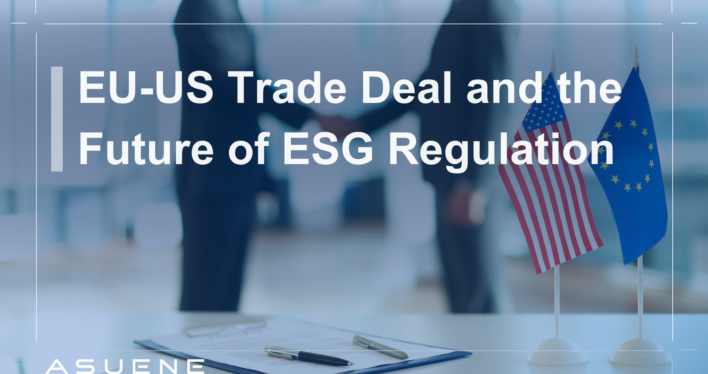- Article Summary
-
Introduction: Trade Meets Sustainability
The recently announced EU-US Framework Agreement on Reciprocal, Fair, and Balanced Trade has surprised many observers. Beyond tariffs and market access, the deal explicitly links sustainability regulations with transatlantic trade. For the first time, the European Union’s flagship sustainability directives, namely the Corporate Sustainability Due Diligence Directive (CSDDD), the Corporate Sustainability Reporting Directive (CSRD), and the EU Deforestation Regulation (EUDR), have been treated as negotiable elements in trade diplomacy. This development matters for global businesses and sustainability professionals because it signals a shift: environmental and social regulations are not only compliance requirements but also bargaining chips in trade negotiations.
The central issue now is how this will reshape ESG data management, supply chain decarbonization, and reporting strategies. For businesses, the immediate effect is growing uncertainty around what sustainability data must be disclosed, how detailed it must be, and whether requirements such as climate-transition plans or liability provisions will remain intact. At the same time, there is a likelihood that the scope and depth of disclosures required could decrease if administrative burdens and climate-transition obligations are relaxed. Even so, any reduction in required detail will vary by region and sector, meaning businesses must still prepare for complex reporting landscapes.
CSDDD and CSRD: From Ambition to Possible Adjustment
The joint statement indicates that the EU will make efforts to ensure CSDDD and CSRD do not restrict trade with the US. Specifically, it refers to commitments to consider reducing administrative burdens, rethinking harmonized civil liability, and revisiting climate-transition obligations. These are not confirmed changes yet but political pledges to review existing obligations in light of US concerns. For companies, this creates uncertainty about the final shape of these regulations and may point to weaker harmonization of global ESG standards in the future. This context reinforces the need for ESG platforms that centralize data, align disclosures across multiple standards, and reduce compliance costs in a fragmented regulatory environment.
EU Sustainability Regulations: Original vs. Potential Adjustments Under Trade Deal
| Regulation | Original EU Position | Potential Adjustments Considered |
|---|---|---|
| CSRD | Detailed, mandatory reporting for large EU and non-EU firms | Efforts to avoid undue trade restrictions; flexibility for US firms with equivalent rules |
| CSDDD | Strict due diligence, harmonized civil liability, climate plan obligations | Possible reduction of admin burden, reconsideration of harmonized liability, softer climate requirements |

EUDR: A Special Carve-Out for the US
The joint statement further recognizes US commodities as posing “negligible risk” to global deforestation. The EU therefore promises to work on addressing US producer concerns regarding EUDR. This does not yet represent a regulatory change but a clear signal that modifications may follow. In practice, it suggests that American exporters could benefit from preferential treatment, while producers in Asia, Africa, and Latin America still face strict due diligence checks. For companies active in sectors such as palm oil, coffee, cocoa, rubber, and timber supply chains, this creates concerns about unequal market conditions. It also highlights the importance of traceability solutions to prove compliance. The EU’s willingness to adjust EUDR for the US underscores that digital tools for monitoring supply chain risk remain essential for non-US exporters.
Transatlantic Trade-Offs and ESG Leadership
By signaling flexibility on CSDDD, CSRD, and EUDR implementation, the EU has shown that trade harmony may take priority over strict sustainability leadership. While this may ease political tensions, it also risks undermining the EU’s credibility as the world’s regulatory trendsetter. At the same time, the openness to adjustment creates opportunities for technological solutions to reduce compliance costs and streamline ESG data collection.
For businesses, the direct impact will be felt in how they disclose sustainability data. Companies may face uncertainty around the level of detail required, the scope of civil liability, and whether climate-transition plans remain mandatory. This uncertainty increases the importance of building flexible disclosure systems that can be adapted quickly. Firms with supply chains extending into high-risk regions will still need detailed traceability and emissions data to satisfy European buyers, regardless of softer obligations for US exporters.
In this environment, digital ESG platforms are especially critical: they allow companies to adapt quickly to shifting requirements while maintaining trust with stakeholders and investors.
Conclusion: Preparing for a Patchwork Future
The EU-US trade deal signals a new reality: sustainability regulations are presented not just as policy instruments but as subjects of political negotiation. This does not mean regulations have already changed but that they are now subject to review and potential adjustment through international negotiations. This creates uncertainty and complexity for global companies. Instead of relying on a single global standard, firms must prepare for a patchwork of evolving requirements across regions. The key takeaway is clear. Invest in scalable ESG data management solutions, anticipate ongoing changes in both EU and US rules, and stay ahead of compliance by integrating sustainability strategy into core business planning. The trade deal may dilute some EU regulations in the future, but the demand for transparent, reliable ESG data will only grow stronger.
Why Work with ASUENE Inc.?
Asuene is a key player in carbon accounting, offering a comprehensive platform that measures, reduces, and reports emissions. Asuene serves over 10,000 clients worldwide, providing an all-in-one solution that integrates GHG accounting, ESG supply chain management, a Carbon Credit exchange platform, and third-party verification.
ASUENE supports companies in achieving net-zero goals through advanced technology, consulting services, and an extensive network.


